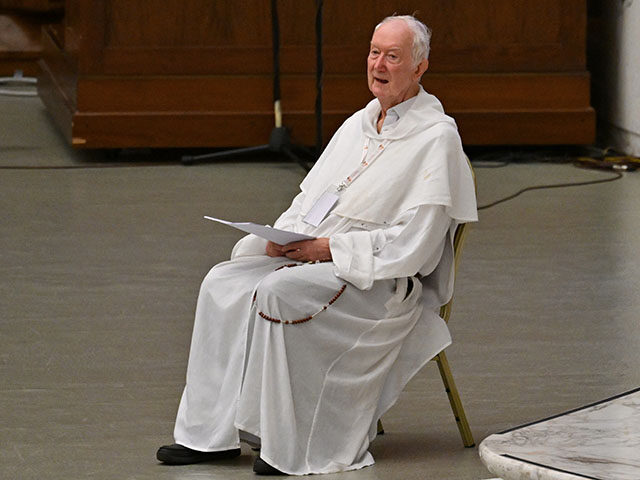ROME, Italy — Gay-rights activist Father Timothy Radcliffe has denied reports that he attributed the African Church’s resistance to homosexuality to an influx of foreign money, insisting that his words were “misinterpreted.”
Radcliffe, who is slated to be made a cardinal by Pope Francis in December, seemed to blame African opposition to homosexuality on “intense pressure” from outside influences like wealthy American evangelicals.
In an October 12 article in the Vatican newspaper L’Osservatore Romano, Father Radcliffe asserted that the Catholic Church must be open to everyone, whoever they are, “the divorced and remarried, gays, transgender people.”
“But in some parts of the world, welcoming gays is seen as scandalous,” he wrote. “Many Catholic bishops in Africa see it as an attempt to impose a decadent Western ideology on the rest of the world.”
The UK priest noted with sadness that Cardinal Fridolin Ambongo of Kinshasa, president of the organization that represents all the Catholic bishops of Africa, had traveled to Rome in December 2023 to explain to Pope Francis why the African bishops could not embrace a Vatican text titled Fiducia Supplicans that opened the possibility of granting priestly blessings to gay couples.
“Never before had all the bishops of a continent repudiated a Vatican document,” Radcliffe stated. “Every attempt was made to calm the crisis.”
“Is the refusal to bless gays in Africa an example of inculturation or a refusal to be a nonconformist?” Radcliffe asked. “Inculturation for one person is another person’s rejection of the nonconformist Gospel.”
Oddly, in his attempt to explain why the African bishops had united in rejecting a proposal to bless gay couples, Father Radcliffe did not reference biblical teaching on homosexuality nor the Church’s unchanging doctrine condemning gay sex.
Instead, he suggested that “African bishops are under intense pressure from Evangelicals, with American money; from Russian Orthodox, with Russian money; and from Muslims, with money from the rich Gulf countries.”
In other words, he seemed to say that if the African bishops are rejecting the idea of blessing same-sex couples, it cannot be out of fidelity to Christ and his Gospel; it must represent a caving to external pressures.
Yet Cardinal Ambongo had already offered an explanation for the African bishops’ action, stating that in Africa “there is no place to bless homosexual couples. Not at all.”
Blessings for individual persons are given “in the hope that the grace of the blessing can help them convert,” the cardinal said. “And if we bless a homosexual, it is also to say that ‘your sexual orientation is not in accordance with the will of God and we hope that the blessing can help you change because homosexuality is condemned in the Bible and by the magisterium of the Church.’”
“We cannot be promoters of sexual deviation. Let them do it in their homes, but not in ours,” he said.
Nonetheless, on Wednesday, Father Radcliffe denied suggesting that the African bishops had been swayed by foreign money in their rejection of Fiducia Supplicans.
“I never wrote or suggested that positions taken by the Catholic Church in Africa were influenced by financial considerations,” the priest said in an official communiqué from the Vatican Synod office.
“I was acknowledging only that the Catholic Church in Africa is under tremendous pressure from other religions and church which are well funded by outside sources.”
What the cardinal actually wrote was:
The African bishops are under intense pressure from evangelicals, with American money; of the Russian Orthodox, with Russian money; and Muslims, with money from the rich Gulf countries. There should have been a discussion with them before, and not after, the publication of [Fiducia Supplicans]. Whatever we think about the declaration, when it comes to dealing with tensions, and to overcome them, we all need to think and engage with each other on a deep level.
In a further wrinkle worthy of an ecclesiastical soap opera, Cardinal Ambongo himself also weighed in, saying he couldn’t believe that Father Radcliffe had actually written such things.
Reading an English-language report on what Radcliffe had said in his L’Osservatore Romano article, the cardinal said that he had “read this article in which we are accused of having taken money from Russia, from the Gulf countries, and from the United States, through the Pentecostal churches.”
“But we are at the synod, and we follow the teachings of Father Radcliffe, and I do not recognize at all what Father Radcliffe said in the article you are mentioning,” he replied to a journalist who asked about Radcliffe’s article.
“Father Radcliffe has never said these things, and this does not correspond at all to his personality,” Ambongo said, “and I can assure you that this is something that is totally untrue.”
In his communiqué Wednesday, Father Radcliffe asserts that “Cardinal Ambongo’s reply did not refer to the article published in L’Osservatore Romano, but to one by Phil Lawler in Catholic Culture of 17 October.”
In that article, Lawler cites Father Radcliffe’s L’Osservatore Romano article at length, highlighting the “intense pressure” felt by African bishops because of all the American Evangelical, Russian Orthodox, and Muslim money flowing in.

COMMENTS
Please let us know if you're having issues with commenting.